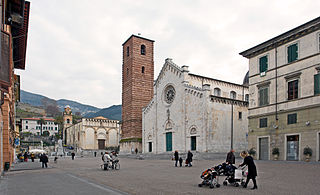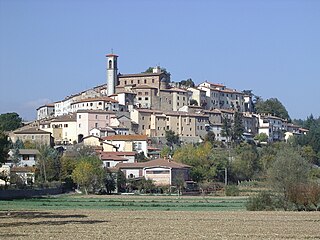San Pietro a Cedda is a Romanesque-style, former Roman Catholic church located in the frazione of Cedda in the town of Poggibonsi, Province of Siena, region of Tuscany, Italy.

San Pietro a Cedda is a Romanesque-style, former Roman Catholic church located in the frazione of Cedda in the town of Poggibonsi, Province of Siena, region of Tuscany, Italy.

This church is first documented in 998, when the Marquis of Tuscany, Ugo, donated this church the Abbey of Marturi. In 1046, it is cited as being under the Pieve di Sant’Agnese a Castellina in Chianti.
The stone façade of the church is simple but decorated in foliated reliefs on the round portal. The mullioned window above the portal has a mysterious dedication to R, S, A, Ω. The apse has columns with decoration with human and animal forms. Traces of frescoes from the 13th century exist. The church also once had a triptych depicting the Madonna and Child with Saints Francis, Peter, Paul, Augustine, and donors painted by Ventura del Moro, also known as Pseudo Ambrogio di Valdese. Stolen in 1979, after recovery it has been housed in the Museo Civico e Diocesano di Colle. [1]

Pisa is a city and comune in Tuscany, central Italy, straddling the Arno just before it empties into the Ligurian Sea. It is the capital city of the Province of Pisa. Although Pisa is known worldwide for its leaning tower, the city of over 91,104 residents contains more than 20 other historic churches, several medieval palaces, and various bridges across the Arno. Much of the city's architecture was financed from its history as one of the Italian maritime republics.

Lucca is a city and comune in Tuscany, Central Italy, on the Serchio, in a fertile plain near the Ligurian Sea. It is the capital of the Province of Lucca. It is famous for its intact Renaissance-era city walls.

Livorno is a port city on the Ligurian Sea on the western coast of Tuscany, Italy. It is the capital of the Province of Livorno, having a population of 158,493 residents in December 2017. It is traditionally known in English as Leghorn.

Vinci is a town – officially a "city" (città) – and comune of the Metropolitan City of Florence in the Italian region of Tuscany. The birthplace of Renaissance polymath Leonardo da Vinci lies just outside the town.

Grosseto is a city and comune in the central Italian region of Tuscany, the capital of the Province of Grosseto. The city lies 14 kilometres from the Tyrrhenian Sea, in the Maremma, at the centre of an alluvial plain on the Ombrone river.

The Province of Salerno is a province in the Campania region of Italy.

Pienza is a town and comune in the province of Siena, Tuscany, in the historical region of Val d'Orcia. Situated between the towns of Montepulciano and Montalcino, it is considered the "touchstone of Renaissance urbanism".

Pietrasanta is a town and comune on the coast of northern Tuscany in Italy, in the province of Lucca. Pietrasanta is part of Versilia, on the last foothills of the Apuan Alps, about 32 kilometres (20 mi) north of Pisa. The town is located 3 kilometres (1.9 mi) off the coast, where the frazione of Marina di Pietrasanta is located.

Asciano is a comune and hill town in the province of Siena in the Italian region Tuscany. It is located at the centre of the Crete senesi between the river Ombrone and the torrent Copra, some 30 kilometres (19 mi) southeast of the town of Siena by rail.

Sansepolcro, formerly Borgo Santo Sepolcro, is a town and comune founded in the 11th century, located in the Italian Province of Arezzo in the eastern part of the region of Tuscany.

Montevarchi is a town and comune in the province of Arezzo, Tuscany, Italy.

San Casciano in Val di Pesa is a comune (municipality) in the Metropolitan City of Florence in the Italian region Tuscany, located about 15 kilometres (9 mi) southwest of Florence.

Lucignano is a comune (municipality) in the Province of Arezzo in the Italian region Tuscany, located about 70 kilometres (43 mi) southeast of Florence and about 25 kilometres (16 mi) southwest of Arezzo.

Monterchi is a Comune (Municipality) in the Province of Arezzo in the Italian region of Tuscany, located about 80 kilometres (50 mi) southeast of Florence and about 20 kilometres (12 mi) east of Arezzo. It sits in the northern part of Valtiberina, the valley where the Tiber river runs going from Emilia-Romagna towards Rome. The valley runs through Romagna, Tuscany and Umbria, parallel to the Casentino Valley.

Poppi is a comune (municipality) in the Province of Arezzo in the Italian region Tuscany, located about 40 km (25 mi) east of Florence and about 30 km (19 mi) northwest of Arezzo.

Buonconvento is a comune (municipality) in the Province of Siena in the Italian region Tuscany, located about 70 kilometres (43 mi) south of Florence and about 25 kilometres (16 mi) southeast of Siena in the area known as the Crete Senesi.
The Hospital of San Paolo, later known as the Spedale of the Leopoldine, is a former hospital from the 13th century, now museum of modern works, located on Piazza Santa Maria Novella number 10, in Florence, region of Tuscany, Italy.
Niccolò di Tommaso was an Italian painter active in Florence, Naples and Pistoia.

The Museo d'Arte Sacra della Val d'Arbia is a small museum of religious art in Buonconvento, in the Val d'Arbia to the south of Siena, in Tuscany in central Italy. It contain a number of paintings by important artists of the Sienese School, among them Duccio di Buoninsegna, Sano di Pietro and Pietro Lorenzetti. The museum is housed in the Palazzo Ricci Socini, close to the parish church of Santi Pietro e Paolo.

The Palazzo degli Anziani also known as the Palazzo del Comune, della Comunitá or del Giano is a Gothic-style stone palace located in the ancient historic center of Pistoia, Tuscany, Italy. The palace served as city hall for centuries; it still belongs to the comune and now mainly houses the Museo Civico d'Arte Antica.